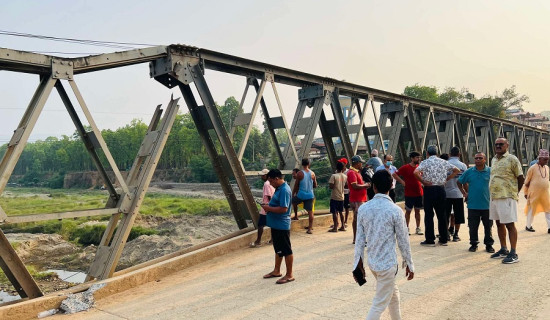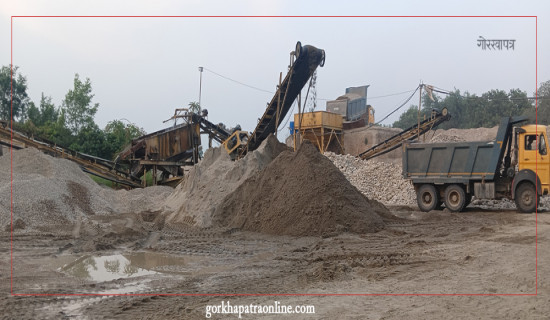- Wednesday, 14 May 2025
Threat Of Electoral Autocracy
An editorial piece in the April 3 international edition of The New York Times said that on being elected, “Autocrats in many parts of the world are succeeding in weakening the rule of law so they can trample on human rights, silence dissent and punish enemies.” Indeed, the need is to check against electoral autocracy, for which a proactive presence of civil society can do a lot. A vibrant and conscientious civil society, grounded in professional and moral integrity, can play a vital role as the watchdog of a given community covering various aspects of life and development.
Such social unit can check corruption and bad governance, encourage the good and not shy away from critiquing the goings-on at different levels of public institutions. The task of playing an honest broker is easier said than done, when a situation affects oneself and close circle of family, friends and relatives. Peer pressure becomes another road block.
Once at the helm of the state affairs, some politicians develop a taste for prolonging their stay in the seat of power by any means. They do not hesitate in unleashing the militant among their cadres against rival groups. At first, formidable opponents are sought to be lured by money, failing which, intimidation is applied. When that, too, does not work, smear campaign tailored to denigrate and demonise the target gets into full swing. Instances of death of rivals under mysterious circumstances are not rare.
Popular wrath
In 1998, Indonesia’s President Suharto stepped down after 32 years in power, in the wake of massive protest for change — a lesson his peers ignored, and some of them to suffer harsh consequences. As the misdeeds of autocrats well up, a slight trouble somewhere develop the capacity of spreading like a prairie fire engulfing all over towns and cities in a burst of popular anger and militant force emanating from the street. Be it in Manila against the Ferdinand Marcos regime, or the military - Chun Doo-Hwan rule in South Korea, street power shows up in unusual force of popular support.
Also to be taken note of is the Arab Spring in the early 2010s, first triggered in the North African state of Tunisia, which quickly had a domino effect on several Arab countries, including West Asia. Libya, Morocco, Syria and Yemen were among those thus affected. Before the Arab Spring effect could make any noticeable presence in Saudi Arabia, the threat was nipped in the bud. Riyadh helped its close ally to crack down on a movement.
Hosni Mubarak’s 30-year rule, too, was toppled after the president lost military support. Libya’s Muammer al-Qaddafi had stayed in power for more than four decades when the Arab Spring ripples invaded the oil-rich country at the active behest of Western powers. Ruling for nearly three decades, Tunisian President Zine el-Abidine Ben Ali was compelled to quit office and leave the country in the face of the mass upsurge against him, with the security forces expressing inability to put down the protest marches without the use of violence. Ben Ali died in exile.
Today, the euphoria that the 2010-11 rallies had fuelled is turned into deep disappointment. Pained and frustrated, thousands of youths are keen to move to Europe across the Mediterranean or to the distant United States in the hope of better job prospects and quit life. Many Tunisians, who returned to their homeland from various foreign countries in the hope that the political changes would offer them minimum conditions for growth and development in the land they were born.
With the most energetic section of the population in such state of mind and mood, the hope and energetic enthusiasm essential for steering a country’s development get missing. This stalls the progress envisaged earlier in accordance with the letter and spirit of its constitution. What went wrong in the country where the Arab Spring kicked off with such force and promise that its effects spilled over to several other states? The new leaders lacked the vision with matching mission for addressing the minimum expectations of average people. They are constantly locked in political bickering even as the state affairs get mismanaged. Inefficiency and bending of law have tainted the functioning of state institutions.
Those seeking the services of human traffickers in their effort to move to foreign cities for a better quality of life under democratic governance echo the depth of their despair. They are prepared to pay their way to such venture with all the risks of aborted schemes and prospect of seeing the money thus spent gone in smoke.
Beyond elections
Scholars and youth leaders in the advanced multiparty democracies, of late, are engaged in public discourse on quality governance. They point out that, while elections are part and parcel of a polity reflecting popular representation come what may, there are specific norms that need to be adhered to with equal measure of integrity. Leaders engaged in enforcing decisions to serve their narrow interests and dubious considerations are seen as parenting electoral autocracy on the strength of their raw legislative majority and the argument that people could displace them in the next elections.
Once elected, claiming popular mandate to decide anything without regard to public accountability toss up signs of dubious tendency. Israel’s multiple-time Prime Minister Benjamin Netanyahu’s recent abortive bid to limit the judiciary’s power through a controversial bill in parliament drew massive protest. The proposed move was to amend the existing law pertaining to override a judicial verdict by a simple parliamentary majority and without provision for any judicial review of the same.
Both at home and abroad, Netanyahu met with strong criticisms. In fact, a large number of Israel’s military reservists refused to attend for service. They were against the “dictatorial regime”. There were even fears that regular troops, too, could resort to insubordination by emulating the reservists. Eventually, in the wake of huge protests, the Netanyahu-led coalition government was compelled to withdraw the bill. The prime minister faces charges of corruption, though he denies any wrong doing. In the absence of an effective mechanism for check and balance regarding the functioning of various vital institutions of the state, democratic governance derails — something to be ignored at the cost of grievous consequences.
(Professor Kharel specialises in political communication.)

















